ChatGPT phenomenon: How chatbot conquered world and became center of controversies
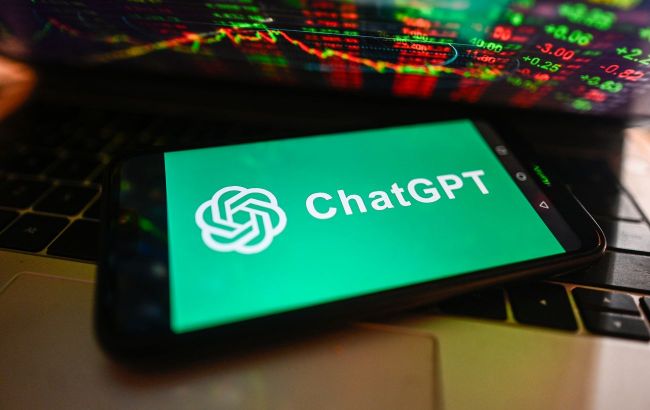 Photo: ChatGPT becomes the most popular application in 2023 (Getty Images)
Photo: ChatGPT becomes the most popular application in 2023 (Getty Images)
A year ago, the company OpenAI introduced ChatGPT. It was a sensation, as ordinary users gained the ability to use artificial intelligence in their everyday lives.
Over the last few months, the chatbot has become even more advanced, and its popularity has broken records. At the same time, concerns in society continue to grow due to the rapid development of AI and the complexity of controlling it.
During the preparation, publications from OpenAI, The Telegraph, The New York Times, Forbes, CNBC, Similarweb, the statement by the head of the Ministry of Digital Transformation, Mykhailo Fedorov, and the publication Nash Kyiv, Chitomo were used.
How ChatGPT Became a World Technology Hit
The debut of ChatGPT took place on November 30, 2022. The American company OpenAI opened access to the language model of artificial intelligence in the form of a chatbot for everyone interested.
In the first 5 days, the number of ChatGPT users reached 1 million, and in just two months - 100 million.
According to Similarweb's research, in October 2023, 1.7 billion people used the desktop version of the chatbot or the mobile application. The open.ai website became one of the most visited in the world (in November - 21st place in the ranking).
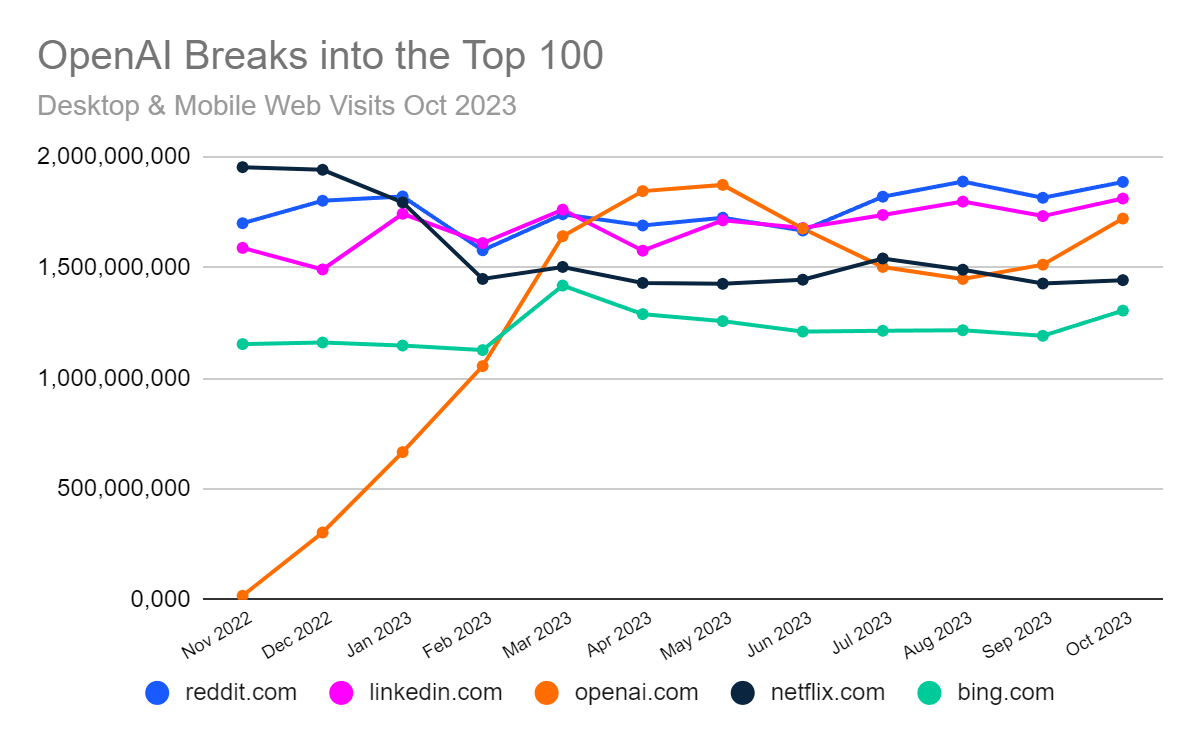
Photo: Traffic Metrics of Top Websites (similarweb.com)
In summary, in 2023, the ChatGPT application on Android was named the best according to users.
The secret to the chatbot's popularity lies in its ability to answer complex questions in simple language. People can ask questions from virtually any field of knowledge, and the chatbot responds in a manner that resembles a conversation with another person rather than with digital artificial intelligence.
ChatGPT can write poems and essays, solve mathematical tasks, generate code, translate texts, and provide personal advice. Furthermore, developers continuously improve its capabilities.
OpenAI's product has inspired other companies to develop their own AI technologies. Competitors to ChatGPT have emerged (Bard, Claude from Anthropic, Character.AI, and CoPilot from Microsoft), but they lag behind in popularity.
Evolution of the bot over a year
As the chatbot was used, its functionality expanded. Initially, there was only the free version of ChatGPT-3, which provided text responses to queries, and the database was limited to information up to the year 2021. The bot's responses were often inaccurate, outdated, and even fictional.
However, the latest upgrade (GPT-4 Turbo) allowed access to data from the internet up to April 2023. The model was trained on a larger dataset.
OpenAI claims that the updated bot gives fewer incorrect answers and can understand "subtler instructions" compared to the previous model. Now, ChatGPT can "see, hear, and speak." Users can communicate with the bot using their voice, exchange images that it processes and responds to.
For example, users can send ChatGPT a photo of a plant and ask it to explain how to care for it.
Another significant innovation is the ability to create custom bots without the need for programming skills.
"It's as easy to create it as it is to start a conversation, give it instructions and additional knowledge, and choose what it can do, such as searching the internet, creating images, or analyzing data," explained OpenAI.
Sharing personal chatbots online will be possible through the "GPT Store," which is planned to launch in early 2024.
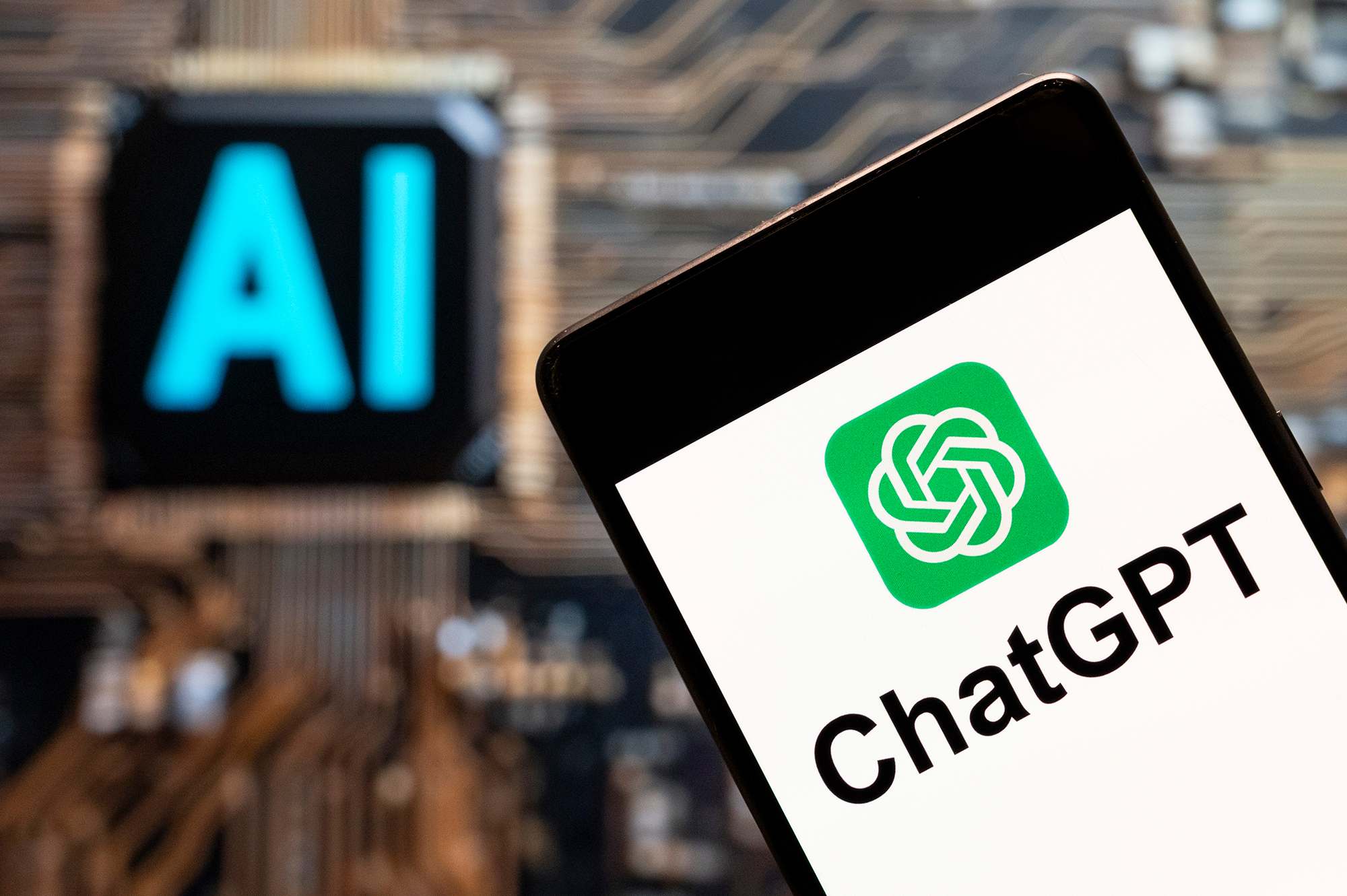
Photo: Chatbot is being constantly improved (Getty Images)
It is important to note that as of now, the features of GPT-4 Turbo are available only through a paid subscription (approximately $20) for the Plus and Enterprise versions. However, there are updates for the free version. GPT-3.5 Turbo can process large amounts of information – capable of working with a context of 16,000 tokens.
Where AI technology is being used
After the launch of the chatbot, critics claimed that similar products with AI technologies would soon leave many professions unemployed, including clerks, marketers, financial consultants, lawyers, accountants, media workers, support service professionals, psychologists, and teachers. Indeed, there have been cases where companies replaced their staff with chatbots, leading to workforce reductions. For example, in India, the IT company Dukaan reduced 90% of its customer support staff, and German publication Bild reported plans to implement AI and lay off some employees.
However, at the moment, AI technologies predominantly play the role of assistants.
In the UK, there is serious consideration of introducing AI tools into the education system. Teachers already use artificial intelligence to write letters to parents and check homework. Prime Minister Rishi Sunak believes that AI will help less privileged citizens access education. He envisions a future where every child will have an individual tutor – a digital AI robot.
As for the ChatGPT bot from OpenAI, it has been implemented by the following companies:
-
Expedia – one of the world's most popular travel planning websites, integrated voice assistance using AI into its services.
-
Microsoft (an investor in OpenAI) – uses the chatbot in the Bing search engine, allowing users to search and receive results through a dialog interface rather than a traditional list of links.
-
Duolingo – a language learning service implemented the ChatGPT model, which helps explain rules to users, and users can practice a language with AI characters.
-
Coca-Cola – the beverage manufacturer uses technology to address marketing tasks (creating personalized advertising texts, images, and messages).
-
Snapchat – integrated a bot in its application that helps with answers to questions or simply engages in conversation.
-
British energy provider Octopus Energy integrated ChatGPT into its customer service channels, and it now handles 44% of customer requests.
-
Udacity – an online course platform used GPT-4 to create an intelligent virtual teacher that can provide students with personalized recommendations and feedback.
-
Slack – created a program using ChatGPT to manage work processes. The AI assistant, Einstein, can compose responses, summarize discussions, or conduct external research.
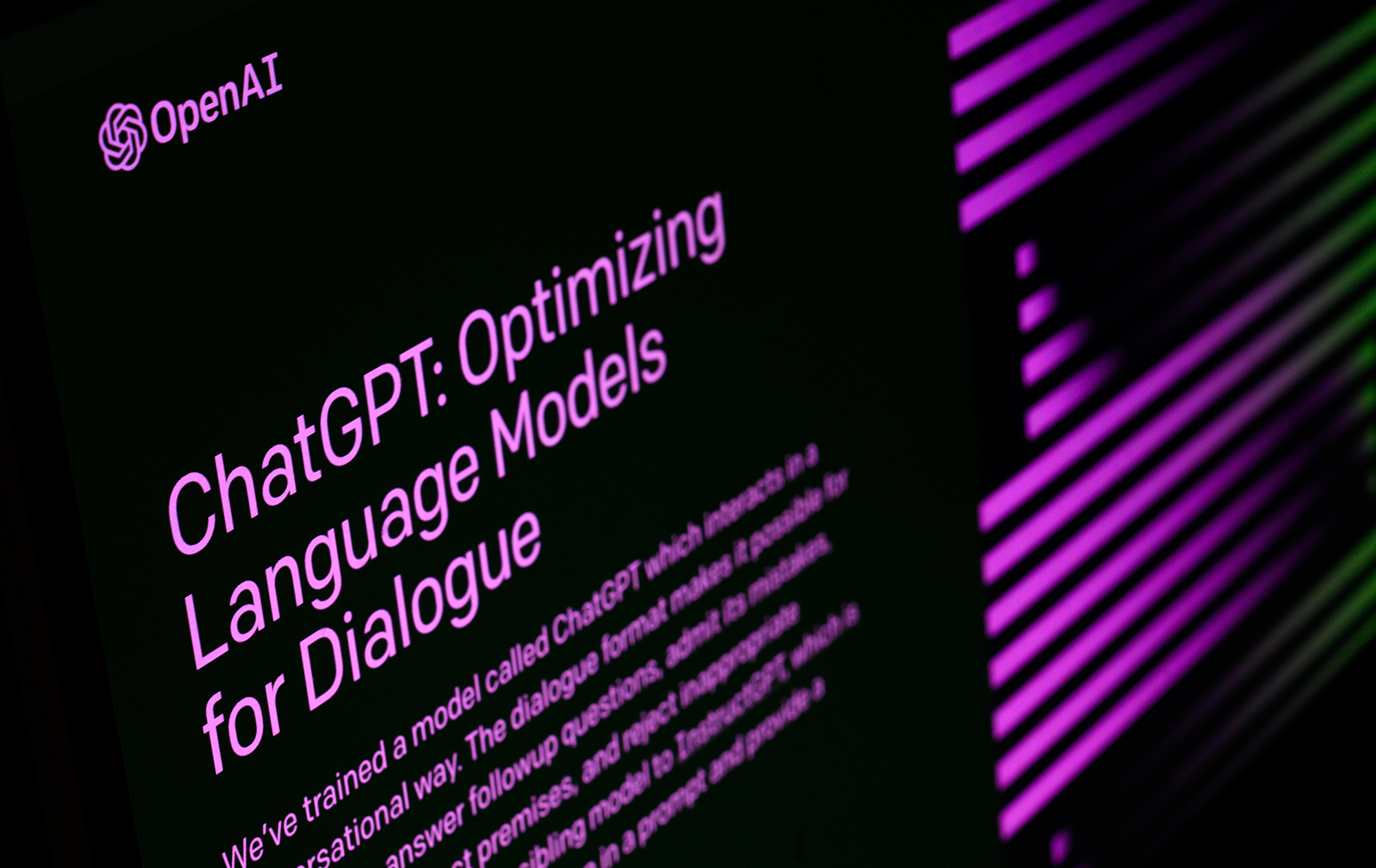
Photo: Businesses worldwide utilize AI chatbots for success (Getty Images)
ChatGPT in Ukraine
In April 2023, the Minister of Digital Transformation, Mykhailo Fedorov, announced that Ukraine is in negotiations with OpenAI about implementing the company's product into state digital services. The Ministry is exploring integration options for ChatGPT, and one of them is as a virtual assistant in the Diya platform under the working name Nadiya.
Experts at Oschadbank are considering the implementation of AI, and this year they have already conducted testing of ChatGPT. ChatGPT managed the bank's social media pages during the testing.
At the same time, Ukrainian businesses are actively utilizing the capabilities of ChatGPT. The publication Nash Kyiv wrote about several such companies. The language learning school, Green Forest Academic, uses AI to write materials for textbooks. The IT company Railsware implemented ChatGPT for working with code and solving analytical tasks. Youscan uses the chatbot in its customer support service, for language translation of materials, and text-related tasks.
In Ukraine, the first magazine created with AI was launched. This electronic media is called Durshlag and focuses on art. The texts in the issue were written by ChatGPT, and the illustrations were created by OpenArt, Midjourney, and DALL E.
Scandals and bans
How the World Attempts to Regulate AI Skeptics believe that the use of AI could lead to the widespread dissemination of misinformation, manipulation, state propaganda, intellectual property rights violations, and cyber attacks.
Developers also acknowledge the risks of artificial intelligence but argue that it is crucial not to reject further technological development. Instead, efforts should be focused on regulating its application.
The head of OpenAI, Sam Altman, has compared artificial intelligence to nuclear weapons. A few months after the launch of ChatGPT, he signed a declaration stating that governments should treat AI as seriously as nuclear bombs. Since then, he has been calling for the creation of a global body, similar to the International Atomic Energy Agency, to address the risks associated with this technology.
However, a few weeks ago, a scandal erupted around Altman. The board of directors of OpenAI fired him, alleging that he "was not always candid in his communication with the board, hindering the board from effectively performing its duties."
As reported by the NYT, numerous grievances from the board included concerns that Altman paid too little attention to the dangers arising from AI. His dismissal was seen as an attempt to take control of artificial intelligence and slow down technological development until protective mechanisms are in place. However, amid massive protests from OpenAI employees, Altman was reinstated in his position.
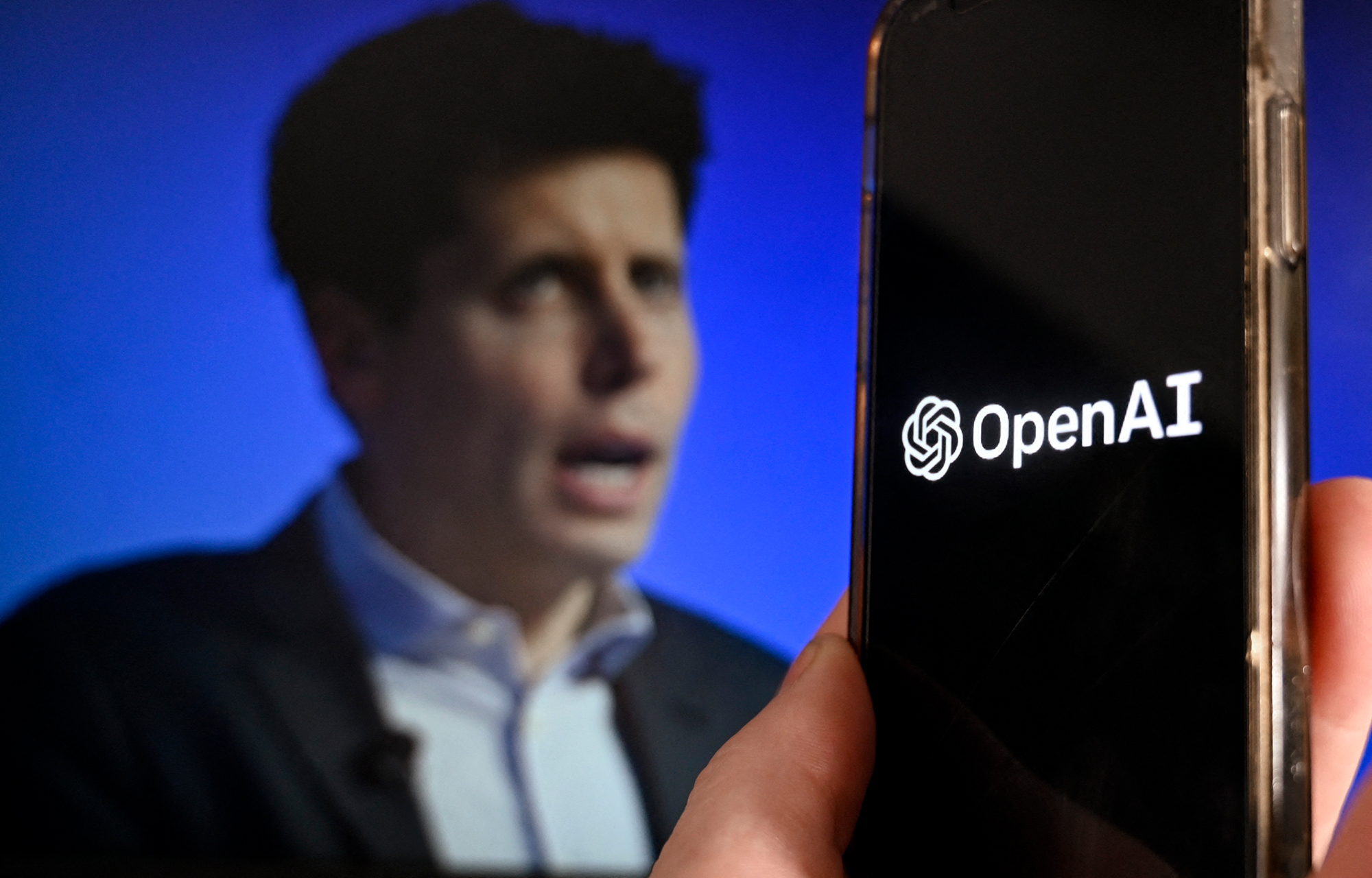
Photo: OpenAI chairman Sam Altman at the center of controversy (Getty Images)
The regulation of Artificial Intelligence (AI) is currently a pressing issue. Legislative bodies are struggling to keep up with the development of digital technologies but are attempting to take measures to mitigate potential risks.
President Joe Biden issued an executive order on AI security. According to the document, AI developers must report to the government about the risks that their systems could pose in aiding countries or terrorists in producing weapons of mass destruction. The order is also aimed at reducing the danger of "deepfakes" that could influence elections or deceive users.
Japan is developing voluntary guiding principles for this technology, while China has imposed restrictions on certain types of AI.
The European Union is advancing a new law on artificial intelligence, which may limit certain risky uses of the technology and ensure compliance with transparency requirements (all created AI content will be labeled).
At the same time, there is currently an issue of copyright compliance for AI. One of the most prominent cases is a lawsuit against OpenAI by 17 writers, including Jonathan Franzen, John Grisham, and George Martin. The lawsuit alleges that OpenAI used authors' works without their permission and compensation by loading them into its AI models.
The Future of AI
In the future, AI chatbots may evolve into personalized assistants capable of meeting specific user needs.
There will also be an increasing presence of so-called copilots – digital assistants embedded in programs.
According to one of the leaders of OpenAI, Miya Murati, ChatGPT continues to evolve, and soon, a keyboard may not be required for interacting with the bot.
"Maybe soon you'll be able to interact with ChatGPT without typing anything," Murati stated, as quoted by CNBC.
Another future goal of the company is to "make bots think independently." ChatGPT should not only provide more accurate information but also form a certain "chain of thoughts" or reasoning, allowing users to understand how the system arrived at a particular response.
According to the OpenAI representative, the development of AI technologies brings both opportunities and risks. For example, AI can be an effective learning tool, but at the same time, personal digital tutors can easily replace teachers.
"Nevertheless, a revolution is coming. And it is society and governments that will determine how and to what extent the AI revolution will impact our lives," Murati believes.
Earlier, OpenAI warned about the development of an AI system capable of destroying humanity. This autonomous AI system could replace a highly skilled professional with knowledge, skills, and experience. The UK, the US, the EU, and China have jointly signed a declaration about the "catastrophic" danger of AI to humanity.

